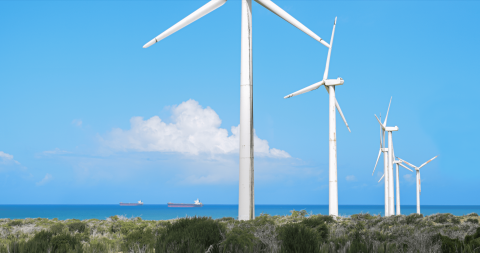
Why transparency matters for the rise of the renewable energy sector
Perspectives from industry, civil society and EITI implementing countries
The fight against climate change is an urgent priority that is reshaping energy systems and economies around the world. According to the UN Intergovernmental Panel on Climate Change, renewable energy sources, such as wind and solar, offer the most impactful and cost-effective way to reduce carbon emissions. The International Energy Agency estimates that renewables are set to become the largest source of global electricity generation by 2025.
The surge of investments in renewables presents a new opportunity for resource-rich countries to diversify their economies and strengthen energy access. To achieve a global energy transition that is fair and equitable, good governance needs to be at the heart of the renewables sector, a point that was reiterated by civil society, industry and EITI implementing countries at a recent Transparency Matters event. Without proper regulation and oversight, mismanagement and corruption can take hold of renewable energy projects and become a barrier to net-zero targets. Recent cases in Italy and Germany provide a cautionary tale and reinforce the urgency of ensuring that transparency is embedded in new projects, as well as in the legislation and regulations underpinning renewable sector development.
Giving communities a stake
As renewable energy projects increasingly venture into environmentally and socially sensitive areas, governments and companies face a host of governance challenges, chief of which is securing their social license to operate. Research by the Business & Human Rights Resource Centre (BHRRC) shows that many renewables and transition mineral projects are giving rise to allegations of environmental and human rights abuses, which can delay projects and slow down the energy transition if not properly addressed.
According to BHRRC’s Executive Director Phil Bloomer, the solution lies in rethinking the business model that underpins renewable energy projects, which he describes as “land-hungry” industries. He suggests an approach where communities hosting operations gain a stake in their ownership and management. This model of shared prosperity not only guarantees communities access to revenues, jobs and energy; it also reduces the risk of suspensions or blockades around renewables and transition minerals projects.
Creating a level-playing field
For companies seeking to benefit from a growing renewables sector, paying attention to environmental, social and governance (ESG) factors is increasingly important for attracting investment and minimising risk. According to Kate Wallace Lockhart, Head of Sustainability at SSE Renewables, transparency should be embedded throughout the entire supply chain, including at the level of the mines that supply raw materials for renewable energy technologies.
Yet companies wishing to operate responsibly cannot act alone, according to Wallace Lockhart. A key aspect of ensuring a fair transition lies in how governments regulate the renewables and mining sectors, and creating an even playing field by holding all companies to the same standards and social safeguards.
Strengthening oversight of renewables and transition minerals
The EITI can be a tool for governments seeking to strengthen accountability and public oversight of their developing renewables sector. EITI reporting in Albania goes beyond the EITI Standard by providing information on the country’s important hydropower sector, including on the legal and regulatory framework, production figures, government revenues and allocation of revenues to subnational authorities. According to Genci Turpo, National Coordinator of EITI Albania, these disclosures help inform decision-making and create an attractive investment environment as the country seeks to further develop its renewables sector.
Countries rich in transition minerals are also increasingly facing public demands for greater transparency on how their mineral wealth is being managed. A surge of investments in Argentina’s mining sector, particularly for lithium projects, is creating pressure for provincial governments and companies to obtain social license from communities to mine in their regions. To this end, Argentina’s government – within the framework of its federal system – is using the EITI’s multi-stakeholder platform to facilitate dialogue among provincial governments, industry, geologists and civil society, particularly on the challenges and concerns raised by communities. According to Pamela Morales, National Coordinator of EITI Argentina, the country’s mining potential can only be realised if the government and other actors build their capacity on using data to inform better policies and management.
The rise of renewables brings about a set of interconnected governance challenges. While it offers the most viable solution to achieving a rapid transition, many stakeholders warn that greater consideration needs to be given to governance and corruption risks, as well as to the needs of vulnerable populations affected by the renewables and minerals boom. The transition must be a collective endeavour, and all stakeholders – including government, industry and civil society – have a critical role to play in ensuring the transition is fair and just.





